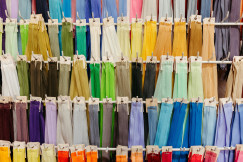Library
02 June 2025
EU textile consumption hits record high, amplifying environmental concerns
Library
02 June 2025
Social dimension
Sustainable competitiveness
Textile
+11 more
Login / create an account to be able to react

The European Environment Agency (EEA) reports that EU citizens consumed a record 19 kg of textiles per person in 2022, intensifying environmental concerns. With textiles ranking among the top five consumption categories for environmental pressure, the briefing calls for urgent action towards more durable, repairable, and recyclable products through circular economy practices.
Topics
Albania
Armenia
Austria
Belgium
Bosnia and Herzegovina
Bulgaria
Croatia
Cyprus
Czechia
Denmark
Estonia
EU-27
Finland
France
Georgia
Germany
Greece
Hungary
Iceland
Ireland
Italy
Kosovo
Latvia
Liechtenstein
Lithuania
Luxembourg
Malta
Moldova
Montenegro
Netherlands
North Macedonia
Norway
Poland
Portugal
Romania
Serbia
Slovakia
Slovenia
Spain
Sweden
Switzerland
Türkiye
Ukraine
Academic / Research and VET Institutions
Company with 250 or more employees
Consumer Organisations
Cultural and Heritage Organisations
Destination Management & Marketing Organisations
EU Institutions
International Organisations
Local Authorities
Media / Journalist Organisations
National authorities
Networks and Federations / Confederations
NGOs / Non-profits
Regional Authorities
SMEs (a company with less than 250 employees)
Social Economy Entity
-
Transition Pathway's building blocks
-
-
Social dimension
-
Sustainable competitiveness
-
-
Industrial ecosystems
-
-
Textile
-
-
Textiles ecosystem areas
-
-
Fibres, yarns and fabrics
-
Apparel and clothing accessories
-
Household/interior textiles
-
Technical textiles
-
Leather and fur
-
Footwear
-
Research and Innovation
-
Technology and Machinery
-
Waste management, reuse and repair
-
Business support and Communication
-
Not area specific (interested in more than one of the above)
-
Share
The European Environment Agency (EEA) reports that in 2022, the average EU citizen consumed 19 kg of clothing, footwear, and household textiles up from 17 kg in 2019. This surge underscores the escalating environmental and climate pressures linked to textile production and consumption. The EEA emphasises the urgent need for a systemic shift towards more durable, reusable, and recyclable textiles to mitigate these impacts.
Key Takeaways:
- Rising consumption: Average per capita textile consumption in the EU reached 19 kg in 2022, comprising 8 kg of clothing, 7 kg of household textiles, and 4 kg of footwear.
- Environmental impact: Textile consumption ranks fifth among EU household consumption categories for environmental and climate pressures, contributing significantly to raw material usage, greenhouse gas emissions, and water and land use.
- Fast fashion influence: The proliferation of fast fashion, driven by online shopping and social media trends, has led to increased production and consumption, exacerbating environmental challenges.
- Need for circularity: The EEA advocates for a transition to circular textile systems, emphasising the production of high-quality goods designed for longevity, repairability, and recyclability.
- Policy implications: Achieving a sustainable textile sector requires coordinated efforts from policymakers, industry stakeholders, and consumers to shift away from the fast-fashion model towards more sustainable practices.
The EEA’s findings highlight the pressing need for transformative changes in the EU’s textile consumption and production patterns. Embracing circular economy principles is essential to reduce environmental impacts and foster a more sustainable future.
For more detailed information, please refer to the original EEA briefing here.
Comments (0)
See also
-
9
Unlocking environmental gains through increased textile recycling
- Categories
- R&I, techniques and technological solutions Social dimension Sustainable competitiveness +13 more
-
55
Transition Pathway for a resilient, sustainable, and digital textiles ecosystem
- Categories
- Infrastructure Investments and funding R&I, techniques and technological solutions +28 more
-
44
The EU’s 2024 Industrial Report reveals green and digital pathways for textiles transformation
- Categories
- Infrastructure Investments and funding R&I, techniques and technological solutions +16 more




